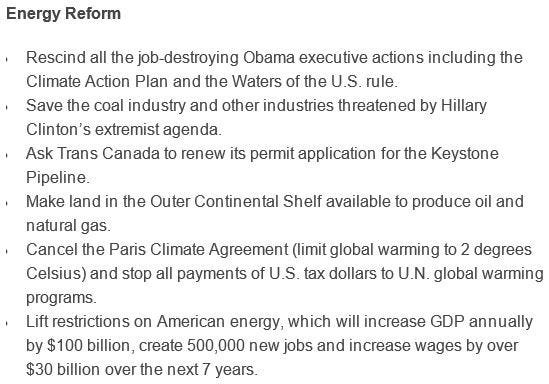Repost from ThinkProgress
Trump ‘Completely Rethinks’ U.S. Energy Policy By Doubling Down On Fossil Fuels
By Ryan Koronowski, August 8, 2016
On Monday in Detroit, Donald Trump sought to reset his campaign again with a speech about the economy to begin “a great conversation about economic renewal for America,” portraying Democratic nominee Hillary Clinton as “a nominee of yesterday.”
Trump aides told Politico prior to the speech that Trump economic vision also involved “a complete rethinking of our energy policy.”
What does this “complete rethinking” look like?
More fossil fuels. And less environmental regulation. A Trump administration would follow the same rhetorical stance on energy as the RNC and the Romney campaign, and the Bush administration’s policy playbook.
The 2016 Republican presidential nominee cited “energy reform” as a priority midway through the speech, attacking “the Obama-Clinton war on coal” and boasting how his own plan to cut regulations on the fossil fuel industry would create jobs.
“I am going to cut regulations massively,” Trump said. “Massively.”
Beyond vague anti-regulatory rhetoric, Trump’s speech cited studies from the Koch-funded Institute for Energy Research, the Exxon-funded Heritage Foundation, and the American Petroleum Institute, all purporting to prove the economic ruin wreaked by the Obama administration’s environmental actions.
Further detail was provided by a Trump campaign email sent to the press which outlined “policy highlights” from Trump’s economic vision:

While Trump may not be able to accomplish all of his stated energy agenda, these policy highlights are essentially the same as the energy plan he outlined in May. His vision lines up almost perfectly with that of the fossil fuel industry.
“Donald Trump’s energy proposals read like a gift registry for the fossil fuel and financial industries,” Greenpeace executive director Annie Leonard said in a statement. “If a U.S. president would attempt to enact any of these proposals it would not only undo the the progress millions of people around the world have achieved on climate change, it would set this country on a path to economic ruin and environmental devastation.”
Trump would “immediately cancel” President Obama’s executive actions, singling out the Climate Action Plan and the Waters of the United States rule. Trump doesn’t mention that the Climate Action Plan’s carbon rule would lower electricity bills and the Waters of the U.S. rule actually helps protect small farmers against pollution from big agribusiness.
He promises to “save the coal industry” — though international coal market dynamics are to blame and U.S. coal jobs are not coming back even with a President Trump.
Bringing back the Keystone XL pipeline and drilling on the Outer Continental Shelf are goals that have been on the conservative drawing board for decades — hardly something that belongs in a completely rethought economic vision.
Cancelling the Paris Climate Agreement and defunding U.S. contributions to United Nations climate programs would drag the United States and the world back decades.
“Lift restrictions on American energy,” to Trump, means fossil fuels and not renewable energy sources like solar and wind, which are growing faster than fossil fuels and getting cheaper at a truly astonishing rate. Trump, however, said last week that renewable energy “is not working so good.”
What the billionaire did not mention on Monday is how much climate change is projected to hurt the global economy: the United States will take a 36 percent GDP hit by the end of the century if its leaders allow it to suffer an unmitigated climate, according to research from ICF International and NextGen Climate Action. Globally, that number jumps to $44 trillion by 2060, according to Citigroup.
Trump called Clinton “the candidate of the past” while his own campaign was “the campaign of the future.”
